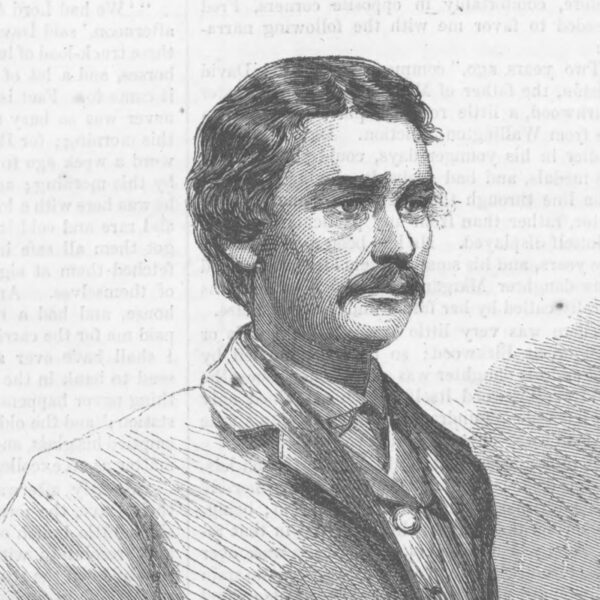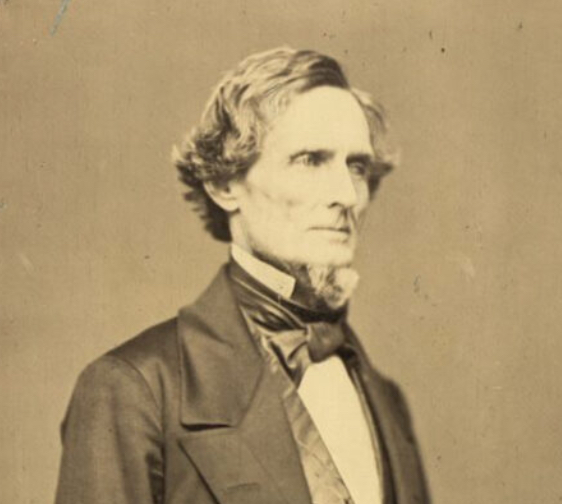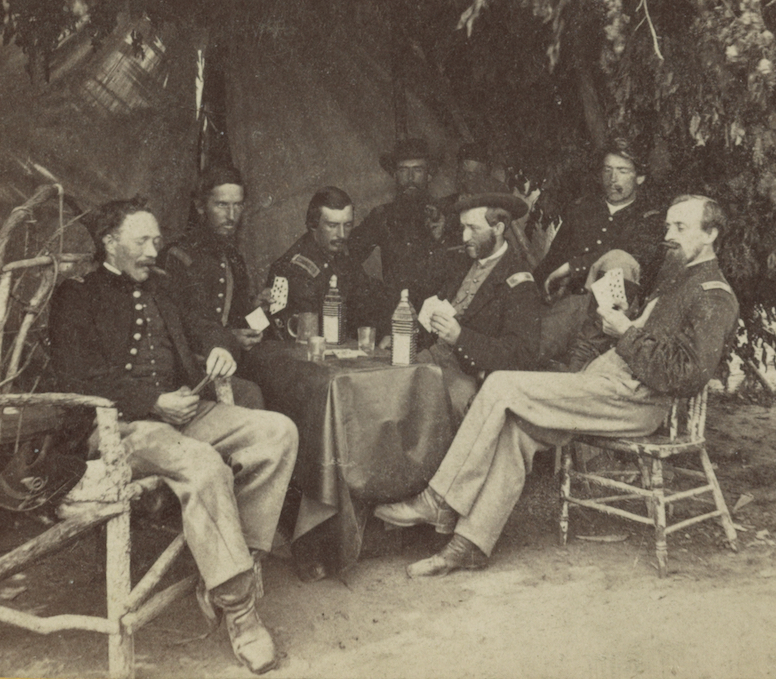
In the Voices section of the Winter 2019 issue of The Civil War Monitor we highlighted first-person quotes by Union and Confederate troops about the pervasiveness of gambling in camp. Unfortunately, we didn’t have room to include all that we found. Below are those that didn’t make the cut.
“A Colonel … was once called to account because there was a good deal of gambling among the officers of the regiment. ‘That may have been the case, sir, some months ago,’ he said, ‘but I can assure you there is nothing of the kind going on now.’ ‘What makes you so confident?’ asked the general. ‘Why, I’ve won all the ready money in the regiment,’ he replied ‘and I don’t allow any gambling on credit.’”
—Charles Bardeen, a musician in the 1st Massachusetts Infantry, on a story that circulated in camp, in his memoirs
“When finished, the oldest member, as also the one most prominent in card-playing, remarked, ‘That every word of that little book is true,’ and then inquired for the pack of cards … and without speaking, walked out to the fire, threw them all in, and quietly watched them until entirely consumed.”
—Rev. A.M. Stewart, chaplain of the 102nd Pennsylvania Infantry, on the reaction of a member of the regiment to reading an anti-gambling religious tract Stewart had distributed to the men
“I entered a tent and found two young men engaged in a game of cards…. I kindly asked ‘if I could take a hand.’ Waiting for my turn, I first threw down ‘Evils of Gaming;’ then ‘Mother’s Parting Words to her Soldier Boy.’ I found that the game was mine. At the sight of the word mother, the tears rolled down their cheeks as they both exclaimed: ‘Parson, I will never play cards again!’”
—Rev. R.W. Cridlin, chaplain of the 38th Virginia Infantry, on an incident in camp in 1863
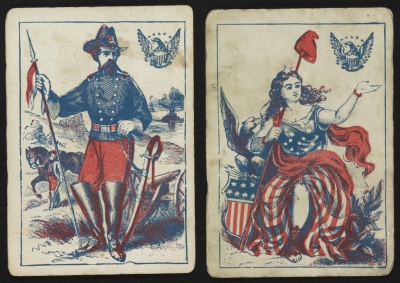
Civil War playing cards
“Our officers are … freely indulging in those refined tastes which army life is so well calculated to develop, by engaging in such innocent amusements and gentle recreations as horse racing…. With such examples, is it any wonder that gambling is on the increase? So far as my observation goes, nine men of every ten play cards for money.”
—Michigan soldier David Lane, in his diary, October 15, 1864
“[A] party of dare-devil comrades are having a game of poker on what seemed to be the safe side of a big tree…. [T]hey suddenly found themselves the storm centre of musketry, and the tree responds actively to the peculiar ‘pit’ of bullets stopped. The boys vow they will finish that game anyway, and swear incessantly at the rebs for disturbing them, and with no perceptible acceleration they complete the game, and then defer to the firing, only to the extent of moving to the other side of the tree.”
—Alfred S. Roe, 9th New York Heavy Artillery, on an incident that occurred in the trenches at Cold Harbor, Virginia, in June 1864, in his history of the unit
“You ought to hear your pious preacher curse. And you ought to see him bet on chuck-luck and farrer. Poor boy, I fear he is ‘forever fallen’ from his high estate.”
—John T. Smith, 13th Alabama Infantry, in a letter to his family, February 1863
“To such an extent was this gambling carried on that men played for the clothes they wore, and discounted every earthly thing they possessed. Indeed there were some inveterate old sports in the First Brigade who would have played with the ‘Old Scratch’ himself, and paid the forfeit with their own souls.”
—Alexander Hunter, 17th Virginia Infantry, in his memoirs
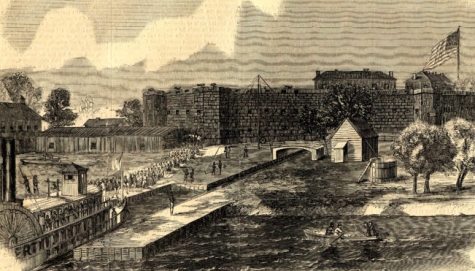
Fort Delaware prison
“The gambling saloons were a curious feature in prison, and were not only numerous but well patronized. Captain Coffee, of Mississippi, was the prince of farodealers, being always gentlemanly in his manners and always attracting the greatest crowd. He never played cards until he was captured, except for amusement, and I am told that a Yankee guard was his first victim. The bettor wagered either in Confederate or Yankee money. He always had a large and anxious looking crowd around his booth. Some quartermasters having been captured, the amount of Confederate money in prison was very large, and changed hands frequently. I heard that Coffee once sent to Dixie from Point Lookout ten thousand dollars. How much United States money he (Coffee) made I cannot say, though at one time, when the Yanks were about searching quarters and persons, he hid in the grass one hundred and eleven dollars in gold, a gold watch, and several hundred dollars in notes, which, of course, some Yank, who knew he was flush, had seen him hide and took care to not let him find it again.”
—Confederate officer Henry Clay Dickinson, on his time as a prisoner of war at Fort Delaware in 1864, in his memoirs
“Three or four squads to be seen gambling at one time in camp, notwithstanding it is the Sabbath day. I have never known more open gambling in the Battery. The only checking influence is withdrawn when the letters cease to come from home, parents, sisters and brothers.”
—Wisconsin artillerist Jenkin Lloyd Jones, in his diary, July 10, 1864
“There was a great horse race yesterday…. Our horse lost more than $1000 for our friends who bet their money on horse races. I am glad the horse got beaten. They have been gambling on it for a year and this I hope will put a stop to it. This dose was badly needed.”
—Rufus Dawes, 6th Wisconsin Infantry, in a letter to his wife, April 8, 1864
“There is a strange, unaccountable fascination about gambling. I have known men who never threw a card before the war began, or have bet a cent since it closed, to lose the last Confederate dollar they had, betting at a game they really knew nothing about.”
—Val Giles, 4th Texas Infantry, in his memoirs
“Since we were paid off a person cannot go five rods in any part of our camp without seeing someone gambling. The day after we were paid there were a good many of the boys to be found who had not a cent left of their two months pay. Every cent of it was gambled away. On the other hand there was some of the boys who had made hundreds of Dollars gambling. The orders are very strict against it, but that’s all the good it does. If you should hear anything about persons belonging to the Co. sending more money home than some of the others do, you can guesshow it is made….”
—James K. Newton, 14th Wisconsin Infantry, in a letter to his mother, June 27, 1863
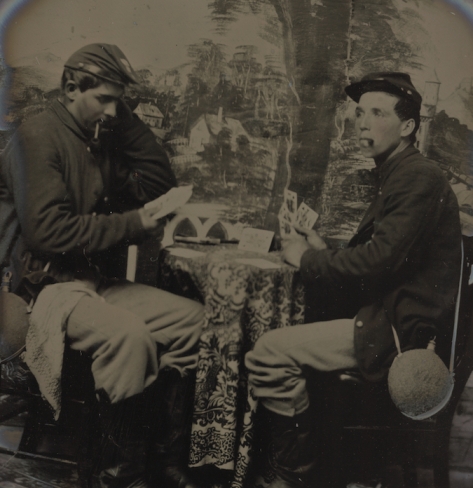
“A young man cannot guard himself too closely in camp … where to be considered an accomplished gentleman it is necessary to be a scientific and successful gambler.”
—Confederate soldier G.L. Robertson, in a letter to his mother, February 12, 1864
“I have bin Horse racesing since I left home. I have Lost one hundred dollars an have got arace to be run on Saturday next I have got dick [his horse] bet on the race and if I loose him I will loose aheap more on the day of the race. I am going to win or loose something.”
—Texas soldier A.E. Rentfrow, in a letter to his sister, February 11, 1862
“Yesterday was Sunday, and I sat at my fire and saw the preachers holding forth about thirty steps off, and between them and me were two games of poker, where each one was trying to fill his pockets at the expense of his neighbor. Chuck-a-luck and faro banks are running night and day, with eager and excited crowds standing around with their hands full of money. Open gambling has been prohibited, but that amounts to nothing.”
—Ruffin Thomson, 18th Mississippi Infantry, in a letter to his mother, December 1, 1862
“In camp. I must say that I feel down in the mouth, only paid a week ago and have not a cent now, having bluffed away all that I did not send home. I don’t think I will play poker any more.”
—Pennsylvania soldier Jacob E. Hyneman, in his diary, February 20, 1864
“The general commanding is pained to learn that the vice of gambling exists, and is becoming common in this army…. [I]t was not supposed that a habit so pernicious and demoralizing would be found among men engaged in a cause, of all others, demanding the highest virtue and purest morality in its supporters.”
—General Robert E. Lee, in a general order issued to the Army of Northern Virginia on November 14, 1862
Sources
A Little Fifer’s War Diary (1910); David Lane, A Soldier’s Diary (1905); Alfred S. Roe, The Ninth New York Heavy Artillery (1899); Michael Barton and Larry M. Logue, eds., The Civil War Soldier: A Historical Reader (2002); Alexander Hunter, Johnny Reb and Billy Yank (1905); Memoir of Henry Clay Dickinson (1910); Diary of Jenkin Lloyd Jones (1914); Service with the Sixth Wisconsin Volunteers (1890); James I. Robertson Jr., Soldiers Blue and Gray (1988); Stephen E. Ambrose, ed., A Wisconsin Boy in Dixie (1961); Official Records, Series I, Vol. 28; Bell Irvin Wiley, The Life of Johnny Reb (1943); Bell Irvin Wiley, The Life of Billy Yank (1952).


